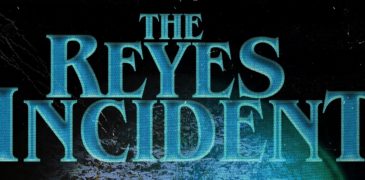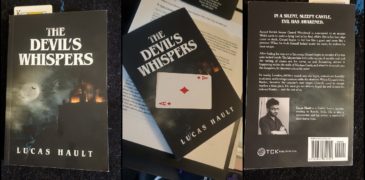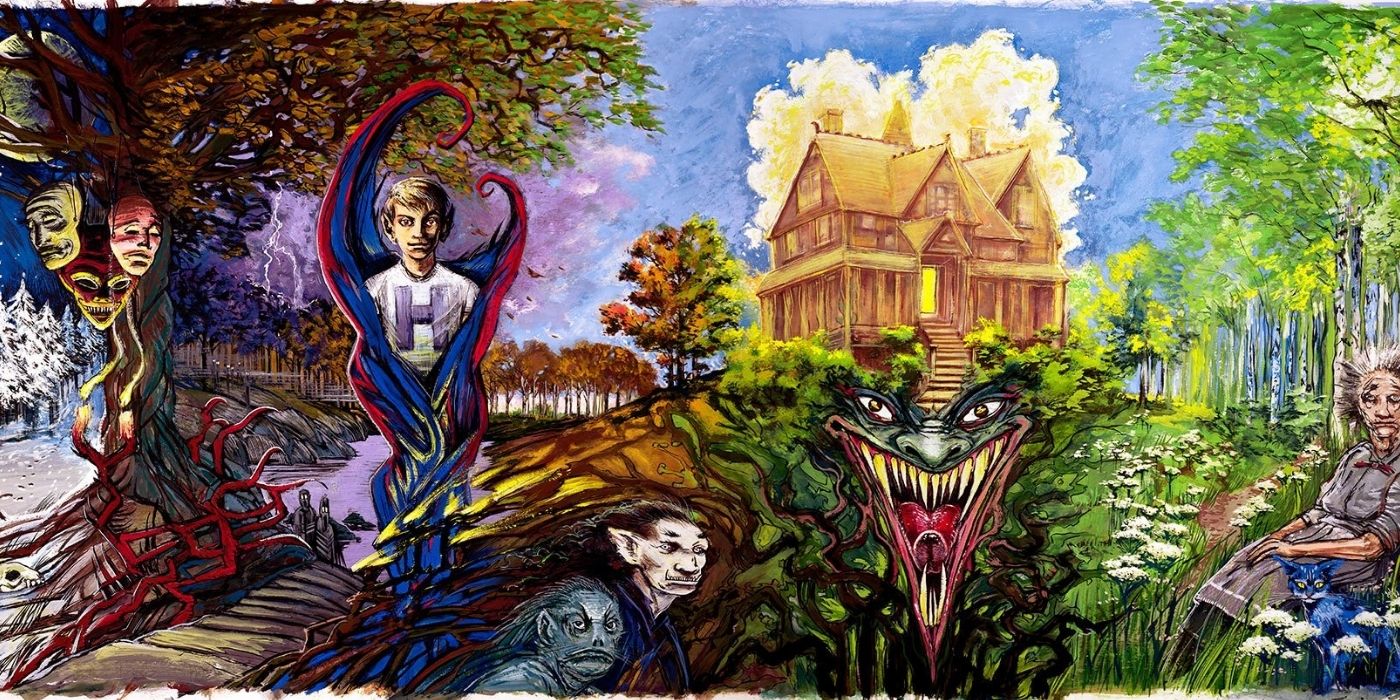
Clive Barker is a figure whose name may not be as well-known as Stephen King or John Carpenter, but even if you don’t know him, you know his work, thanks to the earth-shaking impact his film Hellraiser has made on the horror genre. However, he has yet to recapture this level of mainstream success. Nightbreed, the film based on his novella Cabal, is a beloved underground hit among the horror community, but never reached Hellraiser’s fame, and since The Books of Blood have had a couple of attempts at adaptations that were tragically lacking, it seems like Barker is destined to remain a cult figure, known to the dedicated horror hounds but not to the general public. This isn’t the worst fate that could befall a creator, but it is sad that Barker’s other brilliant works are unfortunately obscure, even to fans of his films.
His ability to balance whimsical fantasy with abject terror is a talent most writers could only dream of. In his work you can find vibes of H. P. Lovecraft, Stephen King, Anne Rice, or Neil Gaiman, but what Barker creates is so uniquely his own that few others can compare. One of his best showcases of his genius is, perhaps surprisingly, his young adult novel, The Thief of Always. This is Eden here, and I’m going to tell you why the world needs to know about this book.
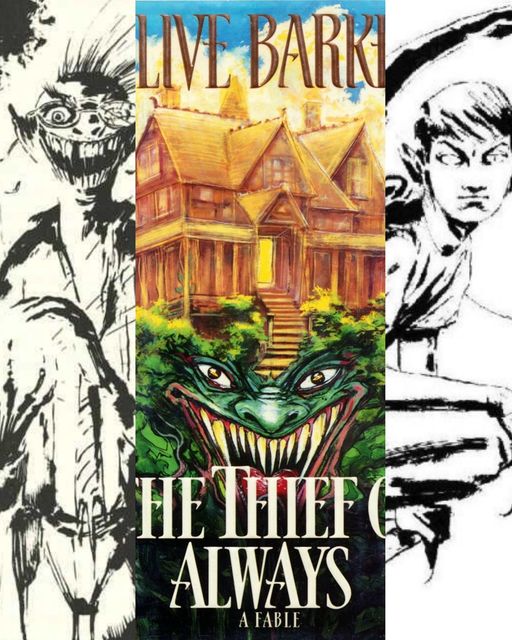
The basic premise is this: 11-year-old Harvey Swick is dying of boredom, stuck inside as the ceaseless rain prevents him from venturing outside to play. Staring out the window into the gloom, he wishes for fun and excitement and an escape from the dullness of his home life. His prayers are ostensibly answered, when a strange but friendly man named Rictus blows in through his window, and extends him an invitation to Mr. Hood’s Holiday House, where every day is promised to be filled with excitement and wonder. Harvey accepts the offer and is led through a portal at a dead-end road to a magical, welcoming house where every morning sees the beauty of spring, the afternoons offer the warm thrill of summer, the evenings are spent trick-or-treating, and the nights are a Christmas wonderland of presents and snowfall. Every day, Harvey and the other children get to experience all these seasons, and many other treats the house has to offer.
However, the true nature of the house starts to reveal itself in little ways. Harvey grows suspicious of never seeing Mr. Hood, who allegedly presides over the house, one of the children goes missing, and a gray, forbidden lake sits at the edge of the property, filled with something which Harvey dreads ever seeing. In order to get to the bottom of the mystery, the young protagonist must resist the wondrous spell of the house, facing his fears head-on to find his missing friend, and struggle against the darkness that exists within his own nature.
You might be reading this thinking, “Hey, that plot sounds familiar.” Indeed, the plot has superficial parallels to Neil Gaiman’s Coraline, which came out ten years later. However, while Coraline proffers more traditional and direct morals such as valuing what you have and being brave, The Thief of Always gets more philosophical, teaching us that facing the darkness within ourselves leads to personal growth, and that we should make the most of our time while we have it.
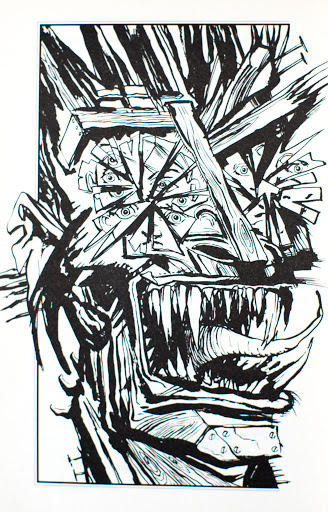
Harvey’s journey is compelling, with a complexity lacking in too many heroes of juvenile fiction. He is sympathetic and likable, while the narrative capably addresses his character flaws in a satisfying way. The rest of the cast is just as engaging, being whimsically unique while never being reduced to absurdity. Every character has their motivations and intricacies, which keeps the plot turning in exciting and emotional ways. Barker has, across his career, displayed a mastery at developing such fascinating characters, and he pulls no punches even when writing for a younger audience.
Clive Barker has written an array of stories, proving time and time again his prowess in crafting narratives that in turn portray riveting drama, wondrous fantasy, tantalizing erotica, and paralyzing horror. He is truly one of the greatest writers of modern fiction, and I encourage you to look into his lesser-appreciated titles such as the one I reviewed here. He’s produced many groundbreaking works — Weaveworld, The Great and Secret Show, and Mister B. Gone to name just a few — and it’s a shame he hasn’t risen to the level of worldwide renown of some of his peers. Don’t let that stop you. Books like these are like portals to other worlds.
More Book Reviews:
Verona: A Ghost Story by Benedict Ashforth (2015) Book Review
When I first laid eyes on the cover of Verona: A Ghost Story written by Benedict Ashforth, it seemed simple and right to the point; a stained-glass window depicting a…
Stacy: Attack of the Schoolgirl Zombies Book Review – The Original Novel Behind the Film
Today, we will be discussing a holy grail of mine for some time. Being one of my favourite Japanese horror films (and something I refuse to shut up about), Stacy:…
The Reyes Incident (2022) Book Review | Who can resist the sirens’ song?
A local legend gone haywire. A small-town cop. An impossible eyewitness testimony. Which is easier to believe—that killer mermaids exist, or that one person is worth risking everything for? For…
Sleep Alone (2023) Book Review | Does Mother Know Best?
For the past six years, Ronnie has worked selling merch for a perpetually touring band. Late nights, sweaty clubs, dingy motel rooms, endless roads—as rough as it’s been, there is…
Recent Reads: Near the Bone by Christina Henry
Hey, GoH gang! Dustin here again with some more Recent Reads that I’d love to recommend to y’all. I rarely have a bad time with the books I read. It takes…
The Devil’s Whispers by Lucas Hault – Book Review
When I first held the novel The Devil’s Whispers in my hands, I was immediately thrilled to see the influence of classic horror. Lucas Hault not only promises to entertain…
Eden is a Soong-type android learning to pass as human through studies of pop culture, humor, and dark fantasy. Perhaps one day she will learn to love and pronounce “hyoo-mahn” correctly. She was written analyses of music, video games, comics, and film. You can find her other writings on Vocal and WordPress.


